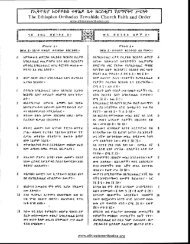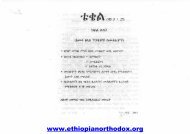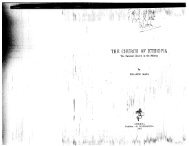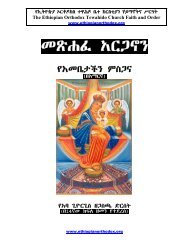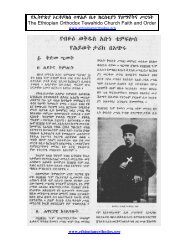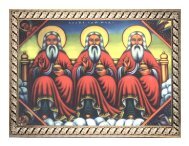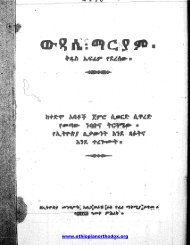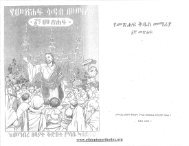Six week Lent - The Ethiopian Orthodox Tewahedo Church
Six week Lent - The Ethiopian Orthodox Tewahedo Church
Six week Lent - The Ethiopian Orthodox Tewahedo Church
Create successful ePaper yourself
Turn your PDF publications into a flip-book with our unique Google optimized e-Paper software.
<strong>The</strong> <strong>Ethiopian</strong> <strong>Orthodox</strong> Tewahido <strong>Church</strong> Faith and Order<br />
www.ethiopianorthodox.org<br />
6 th Sunday of the Great Fast, the hymn is for a good servant who serves well<br />
2Timothy 2 : 1 – 16; 1Peter 5 : 1 – 12; Acts 1 : 6 – 9;<br />
Psalm 39 (40) : 8, 9<br />
To do Thy will, O my God,<br />
I am determined to do it.<br />
Indeed, Thy law permeates my system. (Geez = [it is] in the middle of my belly)<br />
I have preached righteousness in the great gathering<br />
Matthew 25 : 14 – 31<br />
FORMULA FOR ETERNAL REWARD<br />
In all things, our responsibility is to anticipate God’s will; and, to do it as would please<br />
Him on His return. To pray as He has taught us to pray; to deal with each other, as He<br />
has commanded; to walk always in His Way: each of us must do these things according<br />
to what we have received. It is naive to imagine that we know Him as He is. This is<br />
because, in His Divine essence, He is unknowable. Some concentrate on His generosity<br />
and mercy, others on His justice, yet others on His awesome power. Christ is truly the<br />
son of man through the power of the Holy Spirit acting with the cooperation of the Virgin<br />
St. Mary. But, eternally, He is truly the only begotten Son of His Father, without a<br />
mother. Although He has revealed these things to us, these are mysteries: beyond our<br />
comprehension.<br />
However, at this point in the Great Fast, our Forefathers chose this third of four parables<br />
recorded by St. Matthew to explain Jesus’ teaching about the meaning of life. He taught<br />
that the basis of life’s tests is one’s use of talents. God gives us talents to develop<br />
according to His will. He observes what we do with these gifts, in the time of our lives.<br />
How one invests his or her potential in time indicates one’s attitude toward God,<br />
including one’s reactions unto others, to whom He has given different gifts. (Mt. 22:37-<br />
41) While people often make the mistake of counting and comparing how many things<br />
they acquire by use of these talents, God is watching, on a more basic level, how the<br />
talents are invested, as either multiplying talents_ not stuff_ or as burying the talents in<br />
the stuff.<br />
Or, look at it this way. Think of the title of this article, “FORMULA FOR ETERNAL<br />
REWARD,” as another way to understand how God views what people do with their<br />
lives. In His “PARABLE OF THE TALENTS,” our Lord gave a practical example of<br />
how to determine what to expect when He returns in glory to judge us. Our reward will<br />
be based on the Interest which we demonstrate in God’s will. Some people are unsure of<br />
how many talents they have. Rather than counting talents, it may be easier to calculate<br />
by carefully examining one’s whole life against the equation: I = PxRxT First, consider
<strong>The</strong> <strong>Ethiopian</strong> <strong>Orthodox</strong> Tewahido <strong>Church</strong> Faith and Order<br />
www.ethiopianorthodox.org<br />
the Principle of God’s will with regard to whatever talents you have received. Next, the<br />
Rate of your personal application to knowing, and doing His will, in the Time which He<br />
has allotted you on this earth. <strong>The</strong> big unknown is the time element. That’s the point of<br />
the reading from the book of Acts appointed for this day. It should remind us of the<br />
lesson for the Fifth Week of the Great Fast about living the present, always conscious of<br />
God’s presence.<br />
Jesus Christ became one of us to fulfill two divine objectives in our regard. His<br />
intervention has both temporal and eternal implications.<br />
1 . In all things, He did the will of the Father. He, as the unique incarnation of God the<br />
Word, was born as a baby, grew in grace (Lk. 2:52) according to His unified nature.<br />
Christ came to be our example, to demonstrate what it means to be permeated (full<br />
measure) by God’s will. God planned it that way, so that everyone might see how this<br />
process should unfold in the context of one’s lifetime. We must grow into it.<br />
2. God became one of us in all things except sin, in order that we might not just see and<br />
hear about how it can be done, but be empowered to actually do it: find fulfillment, and<br />
thereby escape from the nothingness of sin. We are supposed to receive and grow toward<br />
His fullness, in that grace for grace (Jn. 1:15) which he brought with Him.<br />
What He did, not only affected the people who met Him. It affects us, according to how<br />
faithfully we, as His people, do in His remembrance (Luke 22:19; 1Cor. 11:25) what He<br />
did for us. This we may actively choose to do. God always gives us the choice to reject<br />
Him, or_ each, in our own age, each in unique ways_ to participate in His new and<br />
everlasting covenant. This starts with the washing unto regeneration from that water<br />
which flowed from His side. It is then sealed by the gifts of the Holy Spirit. <strong>The</strong>se initial<br />
gifts of Baptism and Chrismation, like most precious talents, must not be buried in<br />
childhood. Nor should they be buried like some mementos in one’s wallet or safe-deposit<br />
box. Rather, as the initiation into the covenant of the Body of Christ, these talents should<br />
be continuously renewed by regular Repentance, and nourished by His divine Body and<br />
Blood in Holy Communion (qurban).<br />
Just having had the intention of doing God’s will, will not be an acceptable response.<br />
<strong>The</strong> road to Hell is paved with good intentions, which were never actualized in time, but<br />
buried by careless waiting for some imaginary better moment. Instead, we must start<br />
immediately, and endure to the end: accepting His power (grace), and using talents to<br />
discover our original destiny, growing in the Body of Christ, toward that very image and<br />
likeness of God. Just learning how to rehearse chapter and verse may, in time, lead to the<br />
curse of the weeping and gnashing of teeth. To enter into the joy of our Lord, one must<br />
invest whatever gifts he or she has already received to do what, of God’s will, needs<br />
doing in the present. In the end, each of us will surely have to answer for how well we<br />
used well all that we received, as freely as we received it.<br />
Abba Thomas April, 2005



